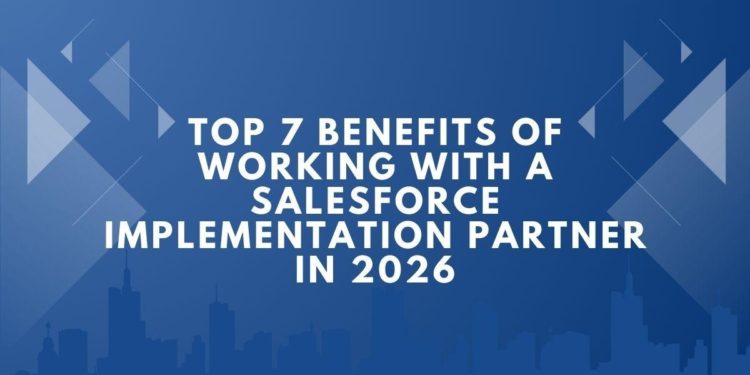Salesforce has become the backbone of digital transformation for thousands of businesses worldwide. In 2025, it is no longer just a sales tool but a powerful multi-cloud ecosystem that supports marketing, service, commerce, analytics, and AI-driven insights. Its potential is vast, but unlocking that potential is rarely straightforward.
Many organizations underestimate the complexity of a Salesforce rollout. From migrating data and customizing workflows to integrating existing systems and ensuring user adoption, the challenges are significant. Without the right expertise, projects often face delays, higher costs, or disappointing adoption rates.
This is where engaging a Salesforce implementation partner can make the difference. A certified partner brings proven methodologies, technical expertise, and structured frameworks to help businesses deploy Salesforce faster and smarter.
Here are seven major benefits of working with a Salesforce partner in 2026.
1. Specialized Expertise Across Salesforce Clouds
Salesforce now includes a wide range of cloud solutions, each designed for specific functions. Sales Cloud manages pipelines, Service Cloud enhances customer service, Marketing Cloud personalizes campaigns, and Data Cloud consolidates enterprise-wide customer data. Each cloud has its own best practices and technical requirements.
A Salesforce partner employs consultants certified across these products. They know when to use out-of-the-box features, when to configure, and when limited custom development is needed. This ensures your implementation is not only functional but also aligned with long-term scalability.
2. Faster Time to Value
The faster your Salesforce platform is up and running, the sooner your teams can benefit from improved workflows, better data visibility, and enhanced customer experiences. Partners accelerate this process by applying accelerators, reusable templates, and tried-and-tested delivery models.
AI is now playing an increasingly important role in this acceleration. Rather than relying on manual effort alone, innovative partners are adopting hybrid models that combine AI agents with human expertise. This approach automates repetitive work such as documentation, testing, and configuration while leaving strategic oversight to experienced consultants. At GetGenerative.ai, this forward-looking model is already being put into practice. Recognized as an innovator in Salesforce implementation services, the team integrates AI agents across the lifecycle from presales and design to build and post-launch support. By blending AI efficiency with human judgment, projects move faster, costs are reduced, and documentation quality improves. The outcome is a shorter path to ROI and a more efficient use of resources.
3. Risk Reduction and Compliance Alignment
A poorly executed Salesforce implementation can create risks ranging from data corruption to regulatory breaches. Industries such as healthcare, finance, and government face strict compliance requirements, making mistakes even more costly.
Partners reduce these risks by following structured frameworks. They ensure data is migrated securely, configure permissions correctly, and design processes that comply with regional and industry standards. With their experience, businesses gain peace of mind knowing their Salesforce system is not only effective but also compliant.
4. Balanced Customization
One of Salesforce’s greatest strengths is flexibility, but too much customization can quickly become a liability. Over-customization leads to technical debt, difficult upgrades, and high maintenance costs. On the other hand, too little customization means the platform may not meet your business needs.
A Salesforce partner helps strike the right balance. They maximize Salesforce’s built-in capabilities before recommending custom workflows or code. This creates a system that is tailored to your processes while remaining easy to update and expand as your business grows.
5. Seamless Integration With Existing Systems
Salesforce delivers its greatest value when it acts as the central hub of customer information. To achieve this, it must integrate with other systems such as ERP, HR, finance, or marketing automation platforms. Without integration, customer data remains siloed, and teams lack a unified view.
Partners have the expertise to manage these integrations. They use tools like MuleSoft or Boomi and leverage APIs to connect Salesforce with existing systems. This ensures data consistency and gives teams the real-time insights needed for better decision-making.
6. Driving Adoption Through Training and Change Management
Technology is only as effective as the people who use it. If employees do not understand or embrace Salesforce, the platform risks becoming underutilized.
A Salesforce partner embeds change management and training into their approach. They deliver role-based training sessions, provide clear documentation, and create adoption metrics to measure success. By involving stakeholders early and building user confidence, they ensure Salesforce becomes an integral part of daily operations.
7. Long-Term Support and Scalability
Going live is not the finish line but the starting point. Salesforce releases three major updates every year, and businesses themselves are constantly evolving. Without ongoing support, systems can quickly become outdated or misaligned with company goals.
Partners offer continuous support services that include system monitoring, performance optimization, and roadmap planning. They help businesses take advantage of new Salesforce features, adopt AI capabilities, and expand into additional clouds. With the right partner, Salesforce remains aligned with business strategy and continues to generate value year after year.
Why 2025 Is the Right Time to Partner
The Salesforce ecosystem is advancing quickly. AI, automation, and industry-specific solutions are redefining how organizations deploy and use the platform. For many businesses, in-house teams lack the expertise or bandwidth to keep pace.
By working with a Salesforce partner, companies gain not only implementation support but also strategic guidance. They ensure projects are delivered efficiently, risks are minimized, and new innovations are adopted effectively.
Key Takeaway
Salesforce is one of the most powerful platforms available to modern businesses, but success depends on how well it is implemented. A Salesforce implementation partner provides the expertise, speed, and scalability needed to unlock its full potential.
As AI reshapes the future of consulting, innovative players like GetGenerative.ai show how the combination of AI agents and human expertise can deliver faster, smarter, and more cost-effective implementations. For organizations planning their Salesforce journey in 2026, partnering wisely is the first step toward achieving true digital transformation.









































































